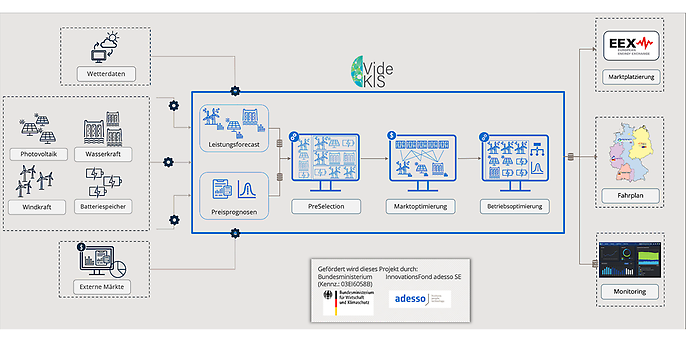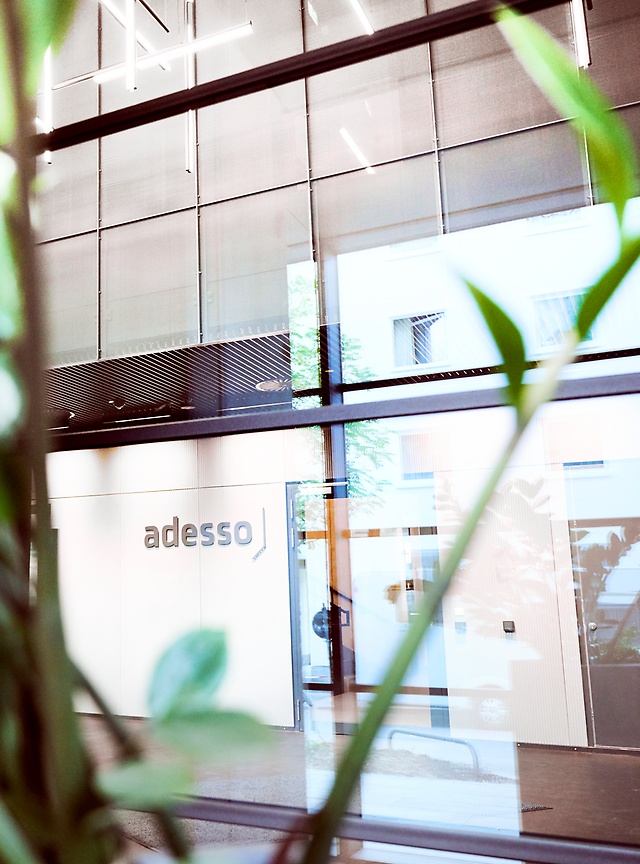16. November 2023 By Ellen Szczepaniak
E-World 2024 – exciting topics in the spotlight
Climate neutrality, growth and digitalisation pose challenges for towns and cities as well as for municipal utilities. In this blog post, you can learn more about the current challenges facing municipal utilities and local authorities in the energy sector and how VideKIS can be part of the solution. You will also find out what exciting topic awaits you from adesso at E-World 2024.
Challenges facing municipal utilities and local authorities
The many challenges facing municipal utilities and local authorities in the energy sector are complex and wide-ranging, as they differ from state to state and region to region.
However, there are also general challenges relating to the energy sector that many municipal utilities and local authorities have to address:
- Energy transition and decarbonisation: The German government’s goal of reducing CO2 emissions by 2045 and achieving climate neutrality will be achieved at a city and municipal level. To reach these goals, it is necessary to create incentives for both industry and private households in the areas of mobility and the provision of heat and energy, including subsidies for renewable energy sources. At the same time, municipal utilities also need to invest in renewables in order to reduce their reliance on fossil fuels and energy from conventional power plants. That notwithstanding, the grid-friendly integration of decentralised generation plants is a topic that simply cannot be ignored, this requiring monitoring, smart meters and intelligent system management.
- Energy efficiency: When it comes to new buildings, it is easy to make them energy-efficient, take renewable energies into account at the planning stage and conserve resources. However, one of the main challenges relates to the modernisation and renovation of existing buildings, which includes providing for a sustainable energy supply. After all, it is important to bear in mind that increasing energy efficiency in power generation, transmission and consumption is critical to conserving resources and reducing operating costs. This means that local authorities and public utilities have to invest in the municipal infrastructure.
- Digitalisation and smart grids: The rollout of smart grids entails a massive investment in technology and upgrades to the infrastructure. It also requires the involvement of a variety of stakeholders in order to develop integrated concepts for the city or town and tap existing potential.
- Regulatory requirements: The energy sector and the regulations that apply to it are in constant flux. As a result of these changes, the industry has to implement new regulations within the legally mandated deadlines. Among other things, this also requires changes and enhancements to systems. Municipal utilities therefore need to be able to respond quickly to ensure they are in compliance with the new regulations and requirements.
- Technological innovation: The integration of new, innovative technologies, such as smart energy systems, storage technologies and artificial intelligence, requires that there is the necessary understanding and flexibility at a municipal level.
The specific challenges vary from location to location based on the conditions found there. That said, the ones touched on above are some of the main challenges facing municipal utilities and local authorities in terms of energy.
How VideKIS can be part of the solution
To ensure a reliable and secure supply of power in future decarbonised energy supply systems, it is vital that decentralised energy generation plants such as wind turbines, run-of-river power plants and photovoltaic systems are also able to provide system services. Up to now, system services such as voltage and frequency stabilisation have primarily been provided by conventional generation facilities such as coal-fired and gas-fired power stations. However, these conventional power plants will be used less and less due to the phase-out of nuclear that has already begun and the phase-out of coal that is set to begin soon. At the same time, the number of decentralised and, above all, small-scale installations on the market is increasing. At the moment, there are major impediments to small-scale plants taking part in calls for bids for the provision of ancillary services pursuant to Section 6(2) of the Electricity Grid Access Ordinance (Stromnetzzugangsverordnung, StromNZV) owing to the large number of regulatory requirements that have to be met and the large amount of administrative work involved.
These challenges are being addressed as part of the VideKIS research project. The main objective of VideKIS is to provide primary control power with the aid of a virtual power plant network consisting of decentralised small-scale plants and micro-installations. One of the main focuses is on power plants that will soon no longer be eligible for EEG subsidies after which they will be unprofitable to operate. By integrating these plants into the virtual power plant network in order to provide ancillary services, producers are incentivised to contribute to grid stability and generate additional income beyond general revenue from energy feed-in. AI-generated performance forecast models for individual systems and price forecasts for the corresponding markets are being developed as part of the research project to ensure appropriate market placement. Market and operations will then be optimised on the basis of these forecasts. In other words, the models forecast which pool can generate the highest yields on which market, taking into account the operating modes of the systems.

The VideKIS control system
E-World 2024: These are the topics that await you next year from adesso
E-World energy & water is where the European energy industry comes to meet. Serving as an information platform for the energy sector, E-World gathers international decision-makers in Essen each year. Over 820 exhibitors from 27 nations will be presenting sustainable technologies and intelligent services for the future of energy. adesso will also on hand again at E-World in 2024 where it will be presenting innovative solutions for digitalising the energy industry, for example, as part of the VideKIS research project.
These are the topics that adesso will focus on at E-World 2024:
Digitalisation generates added value for utilities: To this end, we combine our skills in digitalisation and innovation with our expertise in the utilities industry. Our aim is to work together to shape the energy transition. We work with our customers to develop customised solutions across the energy industry’s value chain. Our agile teams know exactly what they are doing. They are passionate about achieving our customers’ goals. And they are good at what they do, demonstrated by over 1,000 successfully completed projects.
The adesso range of services
As a leading IT service provider, we support energy suppliers on the path to becoming digital pioneers:
- Transforming core IT processes: we find the right technologies and solutions to ensure the success of your digitalisation project.
- Identifying and tapping the potential in terms of efficiency and productivity.
- Data-driven business models: you have large amounts of available to you, and we help you use it in new and innovative ways.
- Regulation: from compulsory to optional, we demonstrate ways how you can create added value beyond what the rules requires.
- Customer-centric service landscapes: we digitalise your interface with customers to create a modern customer experience.
We think: the future is shaped by us working together.
Are you interested in finding out more?
We look forward to meeting you in person at E-World 2024 at booth C127 in hall 1. You are welcome to make an appointment in advance.
Would you like to find out more about exciting topics from the world of adesso? Then take a look at our previous blog posts.
Also intersting:

